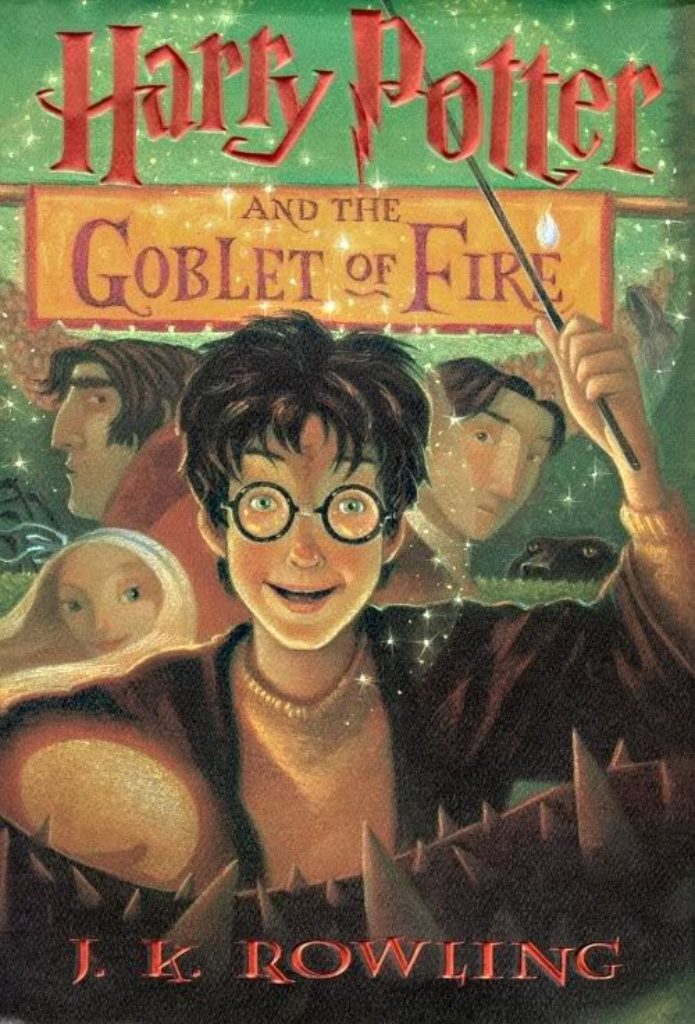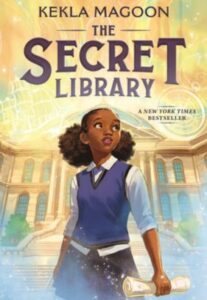Many of the first 75 of this tome’s 700-plus pages are spent rehashing the first three books, so about the only new thing readers discover is that Voldemort is on the move again. Meanwhile, Harry escapes his summer “imprisonment” at the Dursleys’ to attend the Quidditch World Cup with the Weasley family and Hermione. Thousands of international witches and wizards are gathered at the Cup, and chaos erupts when the “Dark Mark” (Voldemort’s sign) suddenly appears in the sky.
Back at Hogwarts for the fourth year, only a few remain concerned about the Dark Mark. Everyone’s attention has been diverted by the news of the Triwizard Tournament—a magical contest between the wizarding Champions of the three largest magical schools: Hogwarts, Durmstrang and Beauxbaton. Harry is too young to be chosen as Hogwarts’ official school champion, but someone finds a way to enter him in the contest anyhow. Once chosen, Harry must participate, and it is soon clear that whoever entered him did so intending him harm.
Through the year-long competition, champions complete three magical tasks, hoping to win honor for their school and a monetary prize for themselves. Along the way, readers discover that the Dark Mark and the Triwizard Tournament are not unrelated after all. Also, something is fishy (again) about the new professor for Defense Against the Dark Arts (Does he want to help Harry or harm him?). Hermione goes on a campaign to free the house elves from slavery, and everyone gets fed up with muckraking journalist Rita Skeeter, who seems determined to ruin Harry’s life.
The Triwizard tournament ends with a twist, and the victory celebration has hardly begun before Harry is sucked into another battle with Voldemort. Rowling delivers on her promise that a well-liked character will die. Once again, Harry escapes with his life, but the end of this story spells more-than-usual concern for the future, because Voldemort has regained his body (which he had lost when he tried to kill infant Harry) and his followers. As the book closes, we find Professor Dumbledore calling the international wizarding community to stand together against the dark side. A large-scale battle is sure to come.
Positive Values
Harry learns (or revisits the lesson) that celebrity is not always grand. His fame in the wizarding community places great pressure on him and he finds himself weary of bearing up under it.
When dissention develops between Harry and Ron, Hermione refuses to be the go-between for them and instead encourages them to communicate with each other: “‘I’m not telling him anything,’ Hermione said shortly, ‘Tell him yourself. It’s the only way to sort this out.'” Harry and Ron reconcile and loyalty and friendship are again celebrated.
Prejudice against certain kinds of creatures based on their history or parentage is denounced several times.
Harry chooses to finish last in one of the Tournament tasks in order to make sure that everyone else is safe. The judges reward him for his “moral fiber.”
On judging the character of a particular leader, Sirius says, “If you want to know what a man’s like, take a good look at how he treats his inferiors, not his equals.” He goes on to criticize the same leader for pursuing success in his job at any cost: “Should have spent a bit more time at home with his family, shouldn’t he?”
Wise advice from Professor Dumbledore: “Curiosity is not a sin, but we should exercise caution with our curiosity.” And a last word: “I say to you all, once again—in the light of Voldemort’s return, we are only as strong as we are united, as weak as we are divided. Lord Voldemort’s gift for spreading discord and enmity is very great. We can fight it only by showing an equally strong bond of friendship and trust.”
Violence
Not much has changed in the intensity of violence. The final battle scene is bloody and frightening. Voldemort’s servant must exhume the bones of the Dark Lord’s father, draw Harry’s blood, and sacrifice his own hand in order to restore Voldemort’s body.
It’s the result of the violence employed has changed. Two characters die in this volume—a nearly anonymous servant at the beginning and a Hogwarts hero at the end.
Family
Now that Harry has found his godfather, family looks better than ever. Sirius Black, found innocent in Book III of the crimes of which he was accused, is on the run from those who don’t know the whole story. Still, as the guardian appointed by Harry’s father, Sirius maintains contact with Harry, encourages him and sends him gifts. He also risks his life by coming back to Hogwarts when Harry is in danger.
Harry’s other family, the Dursleys, are still so awful that it’s meant to be funny, only it’s not quite. Uncle Vernon and crew subject Harry to absurd abuses like sending him a single tissue as a Christmas gift. One change in his relationship with the Dursleys is that they know about and fear Sirius, and Harry uses that fact to his advantage.
Once again, the memory or ghost of Harry’s mother helps him a critical moment of his battle with Voldemort.
Situation Ethics and Worldly Values: Unfortunately, moral relativism is still employed as a normal part of Harry’s world. For instance, Harry and Ron don’t take Divination class seriously, so it’s okay to cheat on their homework: “I think it’s back to the old Divination standby.” “What—make it up?” “Yeah.”
Happily, Harry less frequently rationalizes breaking rules or lying for a good cause. He seems to be learning his lesson that when he heeds the instruction of wise adults, he benefits.
At one point, Harry chooses to lie and then feels guilty: “‘Oh I—I reckon I’ve got a pretty good idea what it’s about now,'” Harry lied. … [His] insides gave a guilty squirm, but he ignored them.”
A big disappointment in this volume is that mild swearing becomes more prominent. Harry himself never uses bad language, but the characters are aging more quickly than readers—and some are making poor choices in this area as they do so.
Adolescent Love
In Book IV, a Yule Ball is held as a part of the Triwizard Tournament, so there is the usual awkwardness of boys asking girls for dates and not doing such a good job of it (no mention of a girl asking a boy).
Rowling captures the clumsiness of young love. Harry has a crush on Cho Chang but barely manages to speak to her. Petty jealousies arise as a result of unrequited crushes but are always given up for the higher ideal of friendship. Hermione’s date to the Yule Ball valiantly saves her life during one of the Tournament tasks.
There are a handful of negative portrayals of budding hormones. One occurs at the World Cup: Magical female creatures called veela sink men into near-trances with their beauty (thankfully, Mr. Weasley reminds the boys to “never go for looks alone”). Also, after the Yule Ball, “Harry looked around, back up the path, and saw Fleur Delacour and Roger Davies standing half-concealed in a rosebush nearby. … Fleur and Davies looked very busy to Harry.”
Magic, Witchcraft and Other Spiritual Elements: Adding to the proliferation of magical elements already established in Books I-III, one Hogwarts professor teaches magical skills as though they are connected to an outside source—Professor Trelawney of Divination Class. Interestingly, she is being increasingly portrayed as silly and superstitious. Harry and his friends don’t trust her. “They were still doing star charts and predictions, but … the whole thing seemed very funny again. Professor Trelawney … quickly became irritated as they sniggered through her explanation of the various ways in which Pluto could disrupt everyday life.”
Rowling persists in the imaginary distinction between good and bad witches: “[Mad Eye Moody—a ‘good’ wizard] was an Auror—one of the best. A Dark wizard catcher. Half the cells in Azkaban [the wizard prison] are full because of him.”
Oddly enough, Hogwarts recognizes the Christmas holidays: The suits of armor in the halls are even charmed to sing “O Come, All Ye Faithful.” How’s that for mixed-up theology?
Conclusion
Despite Rowling’s hints that the books will become darker, it’s not primarily in the area of magic that the trend occurs. Little has changed from how magic is portrayed in the first three books. An odd phenomenon it is when, even in a book about magic, the Western values of reason and accomplishment are held up over the supernatural as a source of power. That’s not necessarily a good thing, of course. Neither does it banish the significant spiritual negatives associated with awakening one’s inclinations toward dabbling in the occult.











